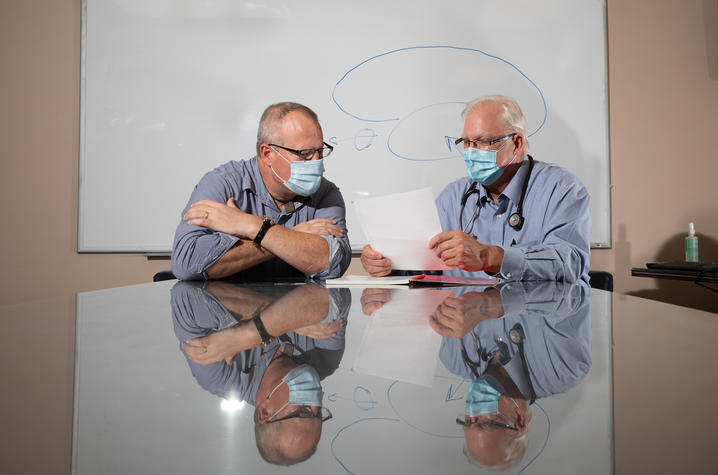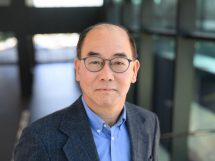
LEXINGTON, Ky. — The motivation driving the work of Pete Nelson, M.D., Ph.D., is personal. His grandmother, Sylvia Becker, died with Alzheimer’s disease, and he says his mother then grew terrified of developing the disease.
Nelson, who is the R.C. Durr Foundation Chair in Alzheimer’s Disease at UK, accomplished the first part of that dream back in 2019, when a group of international researchers, co-chaired by Nelson, discovered a new form of dementia named limbic-predominant age-related TDP-43 encephalopathy, more commonly known as LATE.
Symptoms of LATE mimic Alzheimer’s disease by causing memory loss and problems with thinking and reasoning in old age. But researchers found the LATE-affected brain looks very different from the Alzheimer’s brain.
Now a couple of years after this discovery, Nelson is working towards the second part of the dream, with the world’s first clinical trial for LATE officially underway by his colleagues at the University of Kentucky.
Greg Jicha, M.D., Ph.D., is director of clinical trials at Sanders-Brown and leader of one of the best clinical dementia teams in the country.
Ned and Lu-Ann Farrar were married in 1984. They’ve done many things in their nearly 40 years as a team, including raising two children while both pursuing meaningful careers. Most recently, their teamwork has been focused on Ned’s health.
The Farrars have called Lexington home for decades now, and they say it is truly a blessing that the placemaking these groundbreaking discoveries and then advancing them towards a potential treatment is right in their backyard. Sanders-Brown not only helps evaluate and treat Ned, but they also give LuAnn guidance by providing honest, knowledgeable and compassionate answers.
LATE is a disease estimated to impact 40% of people over the age of 85. Jicha says the medication in this research study may slow or perhaps even stop LATE in its tracks as disease-modifying therapy.
The discovery of LATE, which has led to this trial, is crucial to their overall fight to help people with their memory.
As with many diseases related to aging, people often ask, “Why did I come down with this? Why me?” Jicha says in most cases, it is a combination of things. There can be genetic factors that predispose the individual to develop dementia, hence why some diseases can be seen running in families.
There can also be environmental factors. Identifying those risk factors can help doctors understand what is happening in the brain at the cellular level and then potentially find a medication that already exists that influences the disease course — which is exactly what is happening with the research on LATE.
Based on that knowledge, they identified a drug already used around the world, except in the United States, where it is not yet approved. The medicine has been used for quite some time for heart conditions and researchers at UK believe it could slow or even stop LATE dementia.
It has been a complex process to bring a drug not yet approved in the United States into the country. Jicha and Nelson are both gratified to say that the medication is finally at UK for their participants who appear to be at high risk for LATE.
Advances in science and treatments are not possible without research volunteers like Ned Farrar. Through the years, researchers at Sanders-Brown have been blessed with thousands of such volunteers, and hope to continue bringing in new participants who are interested in knowing if they are at risk.
For those who are believed to be at risk for LATE, UK is now the only place in the world where providers can do something about it thanks to this trial. Participants in the 2-year study are required to do a clinic visit about every three months. During those visits, clinical trial participants go through memory and thinking tests and receive their study drug dose. As with all studies, there is a placebo.
While the Sanders-Brown volunteer cohort is among the most robust in the country, more research volunteers are needed.
Both Jicha and Nelson note how crucial it is to be proactive once you notice changes, even if it seems very minimal.
Nelson believes even those at risk for LATE who receive the placebo during the trial will be better off for participating because of the care of Dr. Jicha, who Nelson jokingly refers to as “Dr. Vitamin J.”
This new clinical trial for LATE is a perfect example of the collaboration that goes on at UK, how Sanders-Brown is a worldwide leader in Alzheimer’s and dementia research, and how the researchers share a common link as teammates.
That goal is also shared by those volunteering to participate in research.
Click here for more Kentucky business news.


















